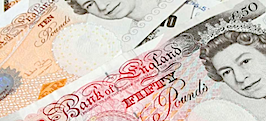Sterling fell to a 31-year-low early on Friday with some traders blaming a “flash crash” that was triggered by computer-generated trading.
With fears growing that the UK Government will decide to pursue a so-called “hard” exit from the European Union, sterling has been under severe pressure for most of this week and was on course for a weekly loss of about 5.4%.
In early trading in Asia on Friday, sterling plunged about 10% from around $1.2600 to $1.1378 in the space of a few minutes.
Reuters reported this low was later revised to $1.1491 — the weakest level for sterling since 1985 — by Thomson Reuters, which owns the Reuters foreign exchange brokerage platform RTSL.
Reuters also said an outlying trade had been cancelled.
Sterling recovered to trade around $1.2275, down 2.7% for the day.
The pound’s plunge in Asia followed a comment by French President Francois Hollande who said the EU needed to remain firm with Britain after it appeared UK Prime Minister Theresa May had decided on a “hard” exit from Europe.
Many investors appear to believe the UK government is heading towards a risky hard Brexit in which the UK gives up full access to the EU single market so that it can impose controls on the UK’s borders.
Shilen Shah, bond strategist at Investec Wealth & Investment, said: “Sterling’s sharp fall in Asian trading is indicative of the market’s nervousness about the UK economy and the prospects of a hard Brexit.
“A disruptive exit from the EU would be a significant negative for the UK economy with sterling taking the brunt of the pain.
“… the politics around Brexit are likely to be a key driver for sterling in the near term – highlighting the emerging market-like sensitivity of the currency.
“The foreign earnings within the FTSE 100 will however continue to provide a hedge against a weak pound.”
Simon Wood, Investment Director, Treasury, at Edinburgh-based Standard Life Investments, said: “Sterling had been looking vulnerable all this week as the market had started to think that Brexit might be ‘harder’ than previously factored in, following recent political statements.
“The market has already been nervous over how the UK will fund both its current account and budget deficits.
“In particular, if foreign investors hold back any UK investment decisions until the terms of Brexit are clearer, or even (worst case scenario) do not invest any new funds, or decide to pull out of the UK altogether in the case of a ‘hard exit’.
“The trigger for the very large move early Friday morning was possibly comments from President Hollande, which hit the newswires at the market’s most illiquid period — after the New York trading session and before the start of the main Asian session.
“There were not many resting Sterling bids in the market overnight due to the proximity of the Non Farm payroll release on Friday, so a moderate amount of selling volume caused an outsized move which then triggered more stops, especially from options traders.
“Many of the stop orders would have been held in systems and triggered automatically, hitting any bids available no matter how reasonable.”
